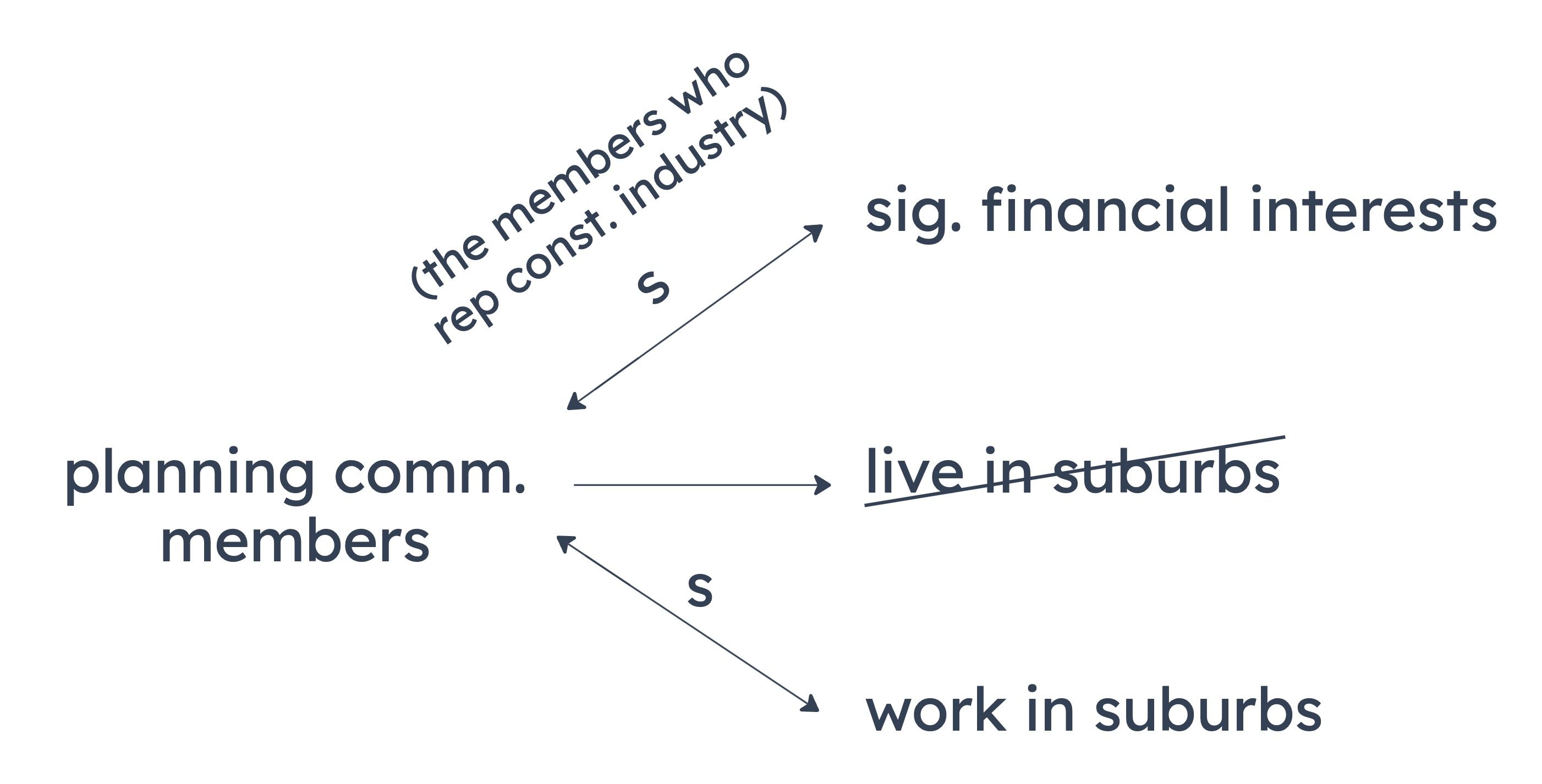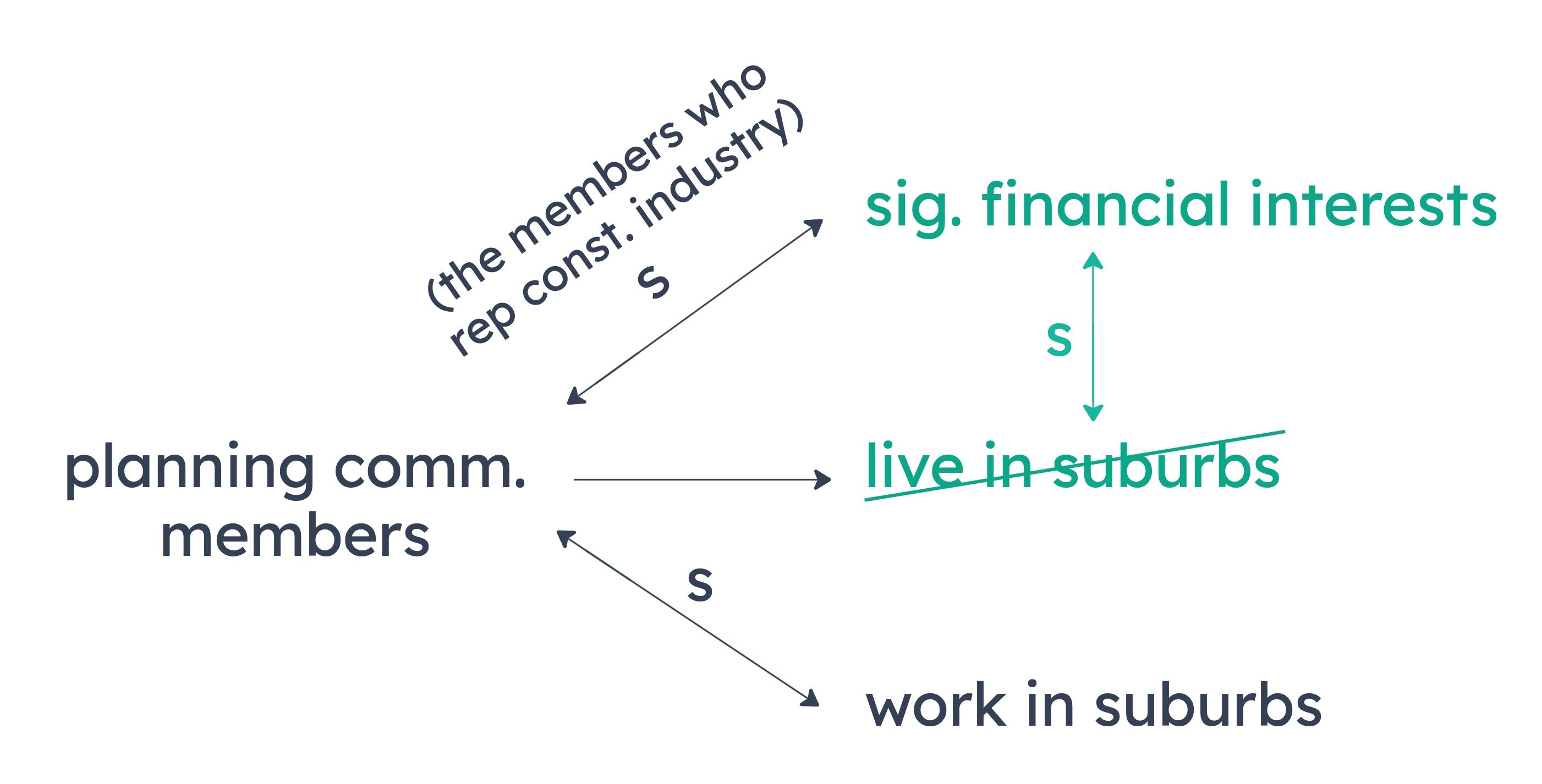Anyone on the planning committee does not live in the suburbs.
Some planning committee members work in the suburbs.

Some people who represent the construction industry do not live in the suburbs.
(If you know All A is B, and Some A is C, you can conclude Some B is C.)
A
No persons with significant financial interests in the planning committee’s decisions are not in the construction industry.
B
No person who has a significant financial interest in the planning committee’s decisions lives in the suburbs.
C
Some persons with significant financial interests in the planning committee’s decisions work in the suburbs.
D
Some planning committee members who represent the construction industry do not work in the suburbs.
E
Some persons with significant financial interests in the planning committee’s decisions do not live in the suburbs.

A
The more attention one pays to driving, the safer a driver one is.
B
The only way to reduce the threat to public safety posed by car phones is through legislation.
C
Some distractions interfere with one’s ability to safely operate an automobile.
D
Any proposed law that would reduce a threat to public safety should be adopted.
E
Car phone use by passengers does not distract the driver of the car.
A
The Springhill authorities do a poor job of enforcing its water emergency laws and many people break the laws without incurring a penalty.
B
The town council of Springhill recently refused to raise the threshold.
C
The threshold is kept at a high enough level to exceed the water requirements of most households in Springhill.
D
The threshold is not as high in Springhill as it is in neighboring towns.
E
The threshold remains at the predetermined level specified by law until a change is approved by the Springhill town council.
Tony: A new kind of videocassette has just been developed. It lasts for only half as many viewings as the old kind does but costs a third as much. Therefore, video rental stores would find it significantly more economical to purchase and stock movies recorded on the new kind of videocassette than on the old kind.
Anna: But the videocassette itself only accounts for 5 percent of the price a video rental store pays to buy a copy of a movie on video; most of the price consists of royalties the store pays to the studio that produced the movie. So the price that video rental stores pay per copy would decrease by considerably less than 5 percent, and royalties would have to be paid on additional copies.
Summary
In light of Tony’s conclusion that the new kind of videocassette tape would be significantly more economical to video rental stores, Anna claims that the videocassette tape itself only accounts for 5 percent of the total price paid by video rental stores for a copy of a movie. Most of the price video rental stores pay for each videocassette tape consists of royalties, therefore the price video rental stores will pay per tape would decrease considerably less than 5 percent.
Strongly Supported Conclusions
The new kind of videocassette tape would not be significantly more economical for video rental stores.
A
The royalties paid to movie studios for movies sold on videotape are excessively large.
We don’t know whether Anna believes the royalties paid to movie studios are excessively large. We only know that royalties account for the majority of the price per videotape copy.
B
Video rental stores should always stock the highest-quality videocassettes available, because durability is more important than price.
We don’t know what Anna believes video rental stores should do.
C
The largest part of the fee a customer pays to rent a movie from a video rental store goes toward the royalties the store paid in purchasing that movie.
We don’t know what a customer’s fees for renting a movie pay for. Anna states that most of the price video rental stores pay for a videotape go toward royalties, but we don’t know what portion of customers’ rental fees cover those royalties.
D
The cost savings to video rental stores that buy movies recorded on the cheaper videocassettes rather than movies recorded on the more durable ones will be small or nonexistent.
Anna believes that switching to the new kind of videocassette tape will not be significantly more economical for video rental stores, since the cost of the tape itself is only a small fraction of the price rental stores pay per copy.
E
If the price a video rental store pays to buy a movie on videocassette does not decrease, the rental fee the store charges on the movie will not decrease.
We don’t know what factors would cause video rental fees to increase, decrease, or stay the same.